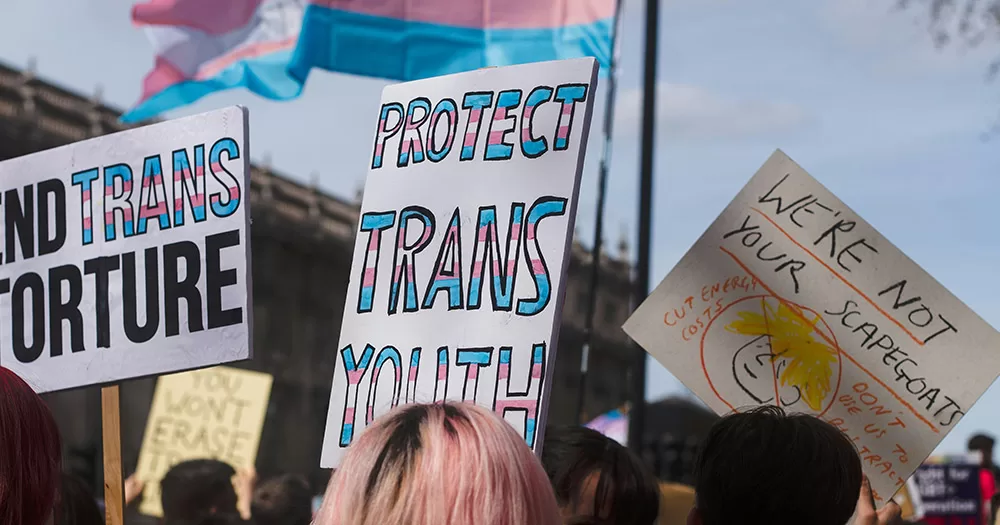On Monday, March 12, England’s National Health Service (NHS) announced that it would no longer be routinely prescribing puberty blockers to children with gender dysphoria unless those children were taking part in a clinical trial. Now, Ireland’s HSE has announced plans to carry out its own clinical trial investigation on the use of puberty blockers in trans healthcare.
Following the NHS’ announcement earlier this week, the BBC reported that, despite the new guidance, clinicians “can still apply” to prescribe puberty blockers to their patients, but only “on a case-by-case basis.”
The NHS decision comes after the country’s doctors determined that there was “not enough evidence” to support the safety or clinical effectiveness of puberty blockers. This decision, however, puts the NHS at odds with the American Academy of Paediatrics, which argues that the use of puberty blockers has been proven to “help reduce gender dysphoria and improve mental health” in trans youth.
While the NHS is likely to begin its own study on the effectiveness of puberty blockers later this year, Professor Donal O’Shea of the National Gender Service, told Newstalk Breakfast, that a similar study is expected to begin in Ireland soon.
“Paul Moran, who is one of our psychiatrists, is working closely with Dr Hillary Cass (who carried out a review into transgender healthcare in England) to look at the design of a clinical trial that will answer the question about puberty blockers – timing, duration and who is suitable,” said O’Shea.
“That’s a really difficult trial to design because you’re going to need really long-term follow up. And, in any trial, putting some people on blockers and others not on blockers…who really think they need blockers (and will be) wondering (why) they’re not taking part in that trial,” O’Shea added.
Tara Hewitt, the Interim Chief Executive Officer of TENI (Transgender Equality Network Ireland) responded to news of the HSE clinical trial on the use of puberty blockers, writing: “While we would like to see more funding and support for research delivering informed consent led gender affirming care here in Ireland, we (TENI) are disappointed to hear announcements in the media around research into the care of trans & non-binary children and young people without further engagement with the trans community. Dedicated engagement with trans children and young people and their families is needed.”
Hewitt continued: “All healthcare should be delivered in line with international best practice. Ireland’s approach to gender affirming care does not align with the World Health Organization (WHO) new International Classification of Diseases (ICD 11) adopted in 2019.”
As stated by the WHO: “Trans related and gender diverse identities are not conditions of mental health, and that classing them as such can cause enormous stigma.”
In TENI’s statement, Hewitt called on Irish policymakers and politicians to “fulfil their commitment to deliver the correct care for all trans and non-binary people based on international best practice and end the pathologising of trans and non-binary identities”.
“With Ireland having no current open public healthcare pathway for children and young people seeking gender affirming care here at home and overall being ranked the worst across 27 EU countries for gender affirming care, it is important that we learn from our clinical colleagues across the EU,” Hewitt added.
Concluding her statement, Hewitt, on behalf of TENI, wrote that “As an organisation we are willing to work with the HSE and policymakers to ensure the voices of trans and non-binary service users and their families are at the heart of future decision-making and we hope swift progress can be made to achieve this.”
© 2024 GCN (Gay Community News). All rights reserved.
Support GCN
GCN is a free, vital resource for Ireland’s LGBTQ+ community since 1988.
GCN is a trading name of National LGBT Federation CLG, a registered charity - Charity Number: 20034580.
GCN relies on the generous support of the community and allies to sustain the crucial work that we do. Producing GCN is costly, and, in an industry which has been hugely impacted by rising costs, we need your support to help sustain and grow this vital resource.
Supporting GCN for as little as €1.99 per month will help us continue our work as Ireland’s free, independent LGBTQ+ media.

comments. Please sign in to comment.